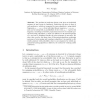Free Online Productivity Tools
i2Speak
i2Symbol
i2OCR
iTex2Img
iWeb2Print
iWeb2Shot
i2Type
iPdf2Split
iPdf2Merge
i2Bopomofo
i2Arabic
i2Style
i2Image
i2PDF
iLatex2Rtf
Sci2ools
62
Voted
DAGSTUHL
2006
2006
On impossibility of sequential algorithmic forecasting
The problem of prediction future event given an individual sequence of past events is considered. Predictions are given in form of real numbers pn which are computed by some algorithm using initial fragments 1, . . . , n-1 of an individual binary sequence = 1, 2, . . . and can be interpreted as probabilities of the event n = 1 given this fragment. According to Dawid's prequential framework we consider partial forecasting algorithms which are defined on all initial fragments of and can be undefined outside the given sequence of outcomes. We show that even for this large class of forecasting algorithms combining outcomes of coin-tossing and transducer algorithm it is possible to efficiently generate with probability close to one sequences for which any partial forecasting algorithm is failed by the method of verifying called calibration.
Related Content
| Added | 30 Oct 2010 |
| Updated | 30 Oct 2010 |
| Type | Conference |
| Year | 2006 |
| Where | DAGSTUHL |
| Authors | Vladimir V. V'yugin |
Comments (0)

